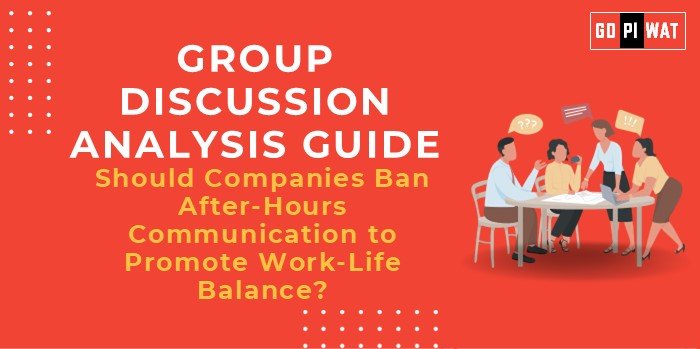📋 Group Discussion Analysis Guide
🌟 Topic: Should Companies Ban After-Hours Communication to Promote Work-Life Balance?
🌐 Introduction to the Topic
Opening Context: “In an era of hyper-connectivity, employees find themselves tethered to their work long after official hours, raising concerns about mental health and work-life balance.”
Topic Background: The debate around banning after-hours communication has gained momentum globally, especially post-pandemic. Countries like France have implemented a ‘right to disconnect,’ while companies grapple with balancing productivity and employee well-being.
📊 Quick Facts and Key Statistics
- Productivity vs. Burnout: 43% of employees globally report feeling burnt out due to overwork (Gallup, 2023).
- Global Policies: France introduced the Right to Disconnect law in 2017 to ensure work-life balance.
- Tech Overreach: 68% of workers check emails after work hours, impacting mental health (Forbes, 2023).
- Business Costs: Burnout-related attrition costs companies an estimated $322 billion annually (Harvard Business Review, 2023).
👥 Stakeholders and Their Roles
- Employers: Balance productivity and ensure employee satisfaction to avoid attrition.
- Employees: Require clear boundaries to reduce stress and burnout.
- Government Bodies: Policy-makers can implement laws ensuring worker rights.
- Technology Companies: Enable tools that balance connectivity with privacy (e.g., “Do Not Disturb” features).
- Human Resource Teams: Implement organizational norms supporting work-life balance.
✨ Achievements and Challenges
Achievements of After-Hours Ban
- Employee Well-being: Improved mental health and work satisfaction.
- Productivity Boost: Happier employees are 12% more productive (University of Warwick).
- Reduced Turnover: Lower employee burnout-related attrition rates.
- Global Examples: France’s Right to Disconnect and similar initiatives in Germany and Ireland have been well-received.
Challenges
- Impact on Productivity: Immediate responses to urgent matters may be delayed.
- Client Expectations: Global clients across time zones require constant availability.
- Lack of Uniform Policy: Industry-specific roles (e.g., healthcare, finance) may not permit such restrictions.
🌍 Global Comparisons
- France: Successfully implemented policies balancing work-life norms without harming productivity.
- Germany: Large corporations like Volkswagen restrict email access after hours.
- India: Absence of legislation leaves employees vulnerable to overwork.
📚 Case Study
Volkswagen (Germany): Employees’ work emails stop syncing after work hours, reducing burnout and improving satisfaction.
📌 Structured Arguments for Discussion
- Supporting Stance: “Banning after-hours communication ensures a healthier work-life balance, leading to reduced burnout and higher long-term productivity.”
- Opposing Stance: “Restricting after-hours communication hampers responsiveness, particularly in client-oriented or urgent scenarios.”
- Balanced Perspective: “While banning after-hours communication promotes well-being, organizations must adopt flexible approaches, such as exemptions for emergencies.”
💡 Effective Discussion Approaches
- Opening Approaches:
- Use statistics: “Burnout costs the global economy $1 trillion annually due to lost productivity.”
- Refer to case studies: “Volkswagen’s email policy is a proven success in promoting work-life balance.”
- Counter-Argument Handling:
- “While responsiveness is crucial, planned delegation and clear after-hour protocols can address urgent needs.”
- “Tools like scheduled responses and work-hour boundaries help ensure communication without impacting emergencies.”
🔍 Strategic Analysis of Strengths and Weaknesses
- Strengths: Enhances mental health, reduces attrition, improves satisfaction.
- Weaknesses: May impact responsiveness, global time zones.
- Opportunities: Flexible work policies, use of technology.
- Threats: Client demands, competitive disadvantage.
📘 Connecting with B-School Applications
- Real-World Applications: HR case studies, organizational behavior projects, and corporate policies for sustainable productivity.
- Sample Interview Questions:
- “How can businesses balance client needs with employee well-being?”
- “Should industries with global operations adopt after-hours communication bans?”
- Insights for B-School Students:
- Explore technology’s role in balancing boundaries.
- Study global companies implementing work-life balance strategies.


